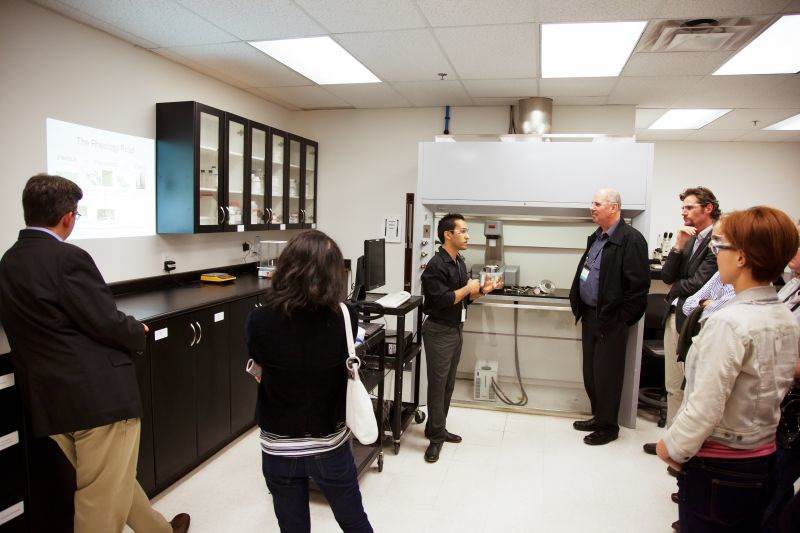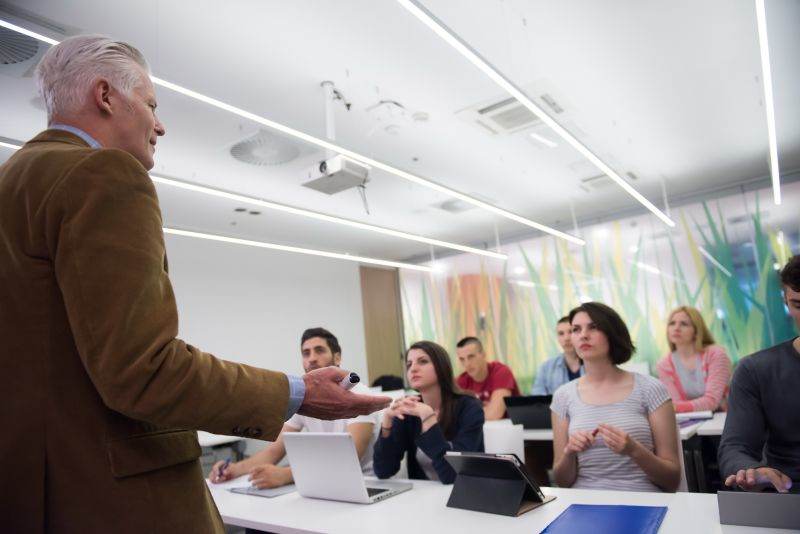Training and Professional Development Course Overview
In an age of rapidly developing technology, the need for ongoing education and professional development and technical training for practicing technologists, engineers and scientists, is more important now than at any time in the past.
The combination of Coanda’s highly knowledgeable staff, extensive industrial experience and state-of-the-art facilities, uniquely positions Coanda to be able to provide unrivalled technical training and professional development.
CFD overview seminar at Coanda - Burnaby
laboratory demonstration at Coanda - Burnaby
Academic Excellence
Coanda has over 25 Ph.D./M.Sc. level engineers and scientist on staff, many of whom have extensive University and Industry based teaching experience. Given the active involvement of Coanda’s staff in cutting edge industrial research and development, and active involvement in University teaching, the quality and relevance of our training and educational offering is unsurpassed.
Practical Perspective
Coanda’s engineering and scientific staff are constantly engaged in important and current industrial research projects, strengthening their ability to provide a perspective and a training experience that is practical, relevant and useful to working professionals. Classroom examples are all taken from the real-world problems drawn from the consulting work performed by Coanda for over two decades.
Hands-on Experience
In all engineering applications there is no substitute for hands-on experience. Given that Coanda operates one of the best equipped and most advanced laboratory facilities in North America, we are able to include laboratory demonstrations and experimental activities as part of our training courses to enrich the educational experience of the participants.
Accessibility
In order to maximize accessibility and reduce the cost of our training programs, Coanda offers state-of-the-art video conferencing capability in combination with its multiple branch offices. Any training course offered in any of Coanda’s three geographic location can be accessed through any of Coanda’s other offices, which helps to minimize travel and accommodation costs for participants.
Partnerships
Coanda regularly works jointly with other organizations (industrial and academic) to present educational courses. For example, Anton Parr and Coanda jointly offer an annual training course titled “Rheology for Practicing Engineers”.

rheology seminar at Coanda – Burnaby in collaboration with Anton-Paar
Current Training Course Offerings
A sampling Technical and Professional Development Courses:
- Industrial Mixing
This two day course provides comprehensive training related to industrial mixing equipment processes. The course begins with an introduction to mixing definitions, mechanisms and fundamental concepts. Topics include segregation, laminar and turbulent mixing, batch and continuous modes, and macro, meso and micro regimes. This is followed by an overview of measurement tools and techniques for mixing studies, analysis tools such as Computational Fluid Dynamics (CFD) and Dimensional Analysis and scale-up methodologies. Building on this solid foundation the focus moves to the analysis of progressively more complex mixing problems including liquid/liquid miscible, liquid/liquid immiscible, Liquid/Solid suspension, a wide range of non-Newtonian systems and finally reacting systems including flocculation. The exploration of the mixing problems is enhanced throughout the training via the use of laboratory demonstrations and case studies, with particular emphasis on the development of mixing parameters and scale-up methodologies for the various systems.
- Rheology for Practicing Engineers
This intensive two day course is designed to provide engineers, scientist and technologists with an understanding of rheology fundamentals, measurement techniques, interpretation of the data, and applications of rheology in problem solving. Lectures includes case studies and examples drawn from industrial practice, combined with informal discussion periods and hands-on experiments will cover the key elements of the subject. Upon completion of this training course, participants will understand the principles of rheology, be capable of operating a range of industrial rheometers, be able to characterize the rheological properties of different complex fluids, know how to analyze and interpret the rheological data and be able to use rheology to formulate products and to design processes.
Custom and Multi-Topic Courses
Given the extraordinary breadth of experience and knowledge of our staff, Coanda has prepared custom training courses for clients in particular topic areas of interest. In some cases these courses are more narrowly specialized in key technology areas for a particular client (for example focusing on mixing-flocculation phenomena), or broadly focused on a range of topic and technologies (for example a pipeline training course for piping operations experts covering hydrodynamics, measurement technology, system operations, safety and maintenance). These courses are tailored very specifically to the requirements of the client and can include class room lectures, laboratory demonstrations, case studies and project work.

University Courses Taught (Current and Past) by Coanda Staff
Many of Coanda’s staff are engaged in teaching at local universities, and we are able to offer courses with similar content for industrial or governmental entities. A sampling of university courses that have been taught by Coanda staff include:
- UBC – ME386/486 – Industrial Fluid Dynamics
Provides a comprehensive overview of Industrial Fluid Dynamics including a review of fluid dynamics fundamental, industrial processes and equipment, dimensional analysis and scale-up, and cases studies - UBC – CHBE 244 – Chemical and Biological Engineering Thermodynamics I
Energy and the first law; second law of thermodynamics; entropy; availability (energy) analysis; thermodynamic properties of fluids, application to power generation, refrigeration, and liquefaction, as well as biological, environmental, and electrochemical systems. - UBC – CHBE 346 – Chemical and Biological Engineering Thermodynamics II
Volumetric and thermodynamic properties of fluids; equations of state; heat effects; ideal and non-ideal mixtures; fugacities and activity coefficients; vapor-liquid and liquid-liquid phase equilibrium; solubility of gases and solids in liquids; chemical reaction equilibrium; equilibrium partitioning of pollutants.

